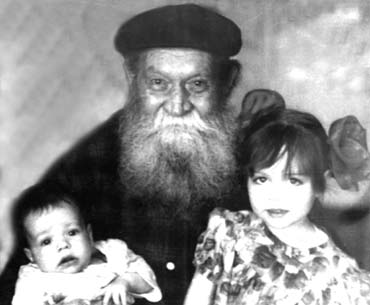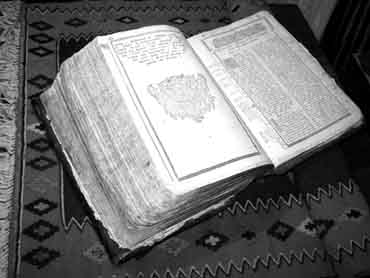| Общероссийская
Газета: Екклесиаст, No
6
(91) 2004 |
All-Russsian Newspaper: Ecclesiastes, No 6
(91) 2004 June |
Духовное наследие[Дедушка и пресвитер Василий Семенович Трущелев] |
Spiritual Heritage[Grandfather and Presbyter Vasiliy Semenovich Trushchelev] |
| Молоканством называли одно из течений в христианстве, которое возникло в 60-70-е гг. XVIII века в России. | One of the branches of
Christianity is called Molokanism,
which arose
in the 1760s-1770s in Russia. |
| Существует несколько версий возникновения этого необычного названия. По одной из них, молокане ассоциируют Библию с образом "духовного молока", по другой, все молокане были абсолютными трезвенниками и получили название по своему любимому напитку. | There are several versions of
the appearance of this uncommon name. In
one of them, the Molokans consider the Bible a form of "spiritual
milk", in another all Molokans were absolute teetotallers and were
named for their favorite beverage. [Another version: from the Milky
Waters region where many lived in South Ukraine.] |
| Селились молокане по окраинам
Российской империи отдельными селами. На начало 2004 года в России
зарегистрировано всего 28 общин молокан. Но очень часто потомки молокан
посещают другие протестантские церкви. |
The Molokans settled on the
outskirts of
the Russian Empire settled in
separate villages. By the beginning of 2004 in Russia only 28
communities of Molokans were registered. But very frequently
the descendants of the Molokans attend other protestant churches. |
| Прихожанкой "Церкви Божьей" города Ярославля является Екатерина Копытина, дедушка которой, Василий Семенович Трущелев, был членом молоканской общины. Его уже нет в живых, но внуки сохранили самые светлые воспоминания об этом человеке, Василий Семенович Трущелев | Ekaterina Kopytina, a parishioner of the "Church of God" of Yaroslavl' city, reports that her grand-dad, Vasiliy Semenovich Trushchelev, was a member of the Molokan community. He is no longer living, but his grandchildren preserved the brightest recollections about this man, Vasiliy Semenovich Trushchelev. |
 На снимке: Василий Семенович Трущелев с внуками In the photo: Vasili Semionich Trushchlev with grandaughters |
 Библия — The Bible |
| Мой дедушка приехал в Ярославль в 1991-ом году из села Морозы, которое находилось в Азербайджане. Когда-то в этом селе жили только одни молокане, выселенные из центральной России в 40-х годах XIX века. Дедушка был пресвитером местной церкви. | My grand-dad arrived in Yaroslavl' in 1991 from the village Morozy [Marazy Russkie], which was located in Azerbaijan. At one time only Molokans lived in this village, evicted from central Russia in the 1840's. Grand-dad was the presbyter of the local church [prayer house]. |
| Запомнилось то, что каждое
воскресение у него всегда было огромное желание идти на собрание, чтобы
слушать Божье Слово. В Ярославле он искал церковь, похожую на ту, что
оставил в родных краях. Он побывал на многих собраниях, у Свидетелей
Иеговых, в православной церкви. Он всегда рад был побывать там, где
собираются во имя Бога. С кем-то не соглашался в христианских
доктринах, приглашал домой и по Библии разъяснял свою точку
зрения. |
We remember that on each Sunday
he always had an enormous desire to go to a [prayer] meeting [church]
in order to listen to the word of God. In Yaroslavl' he searched for a
church, similar to that which he left in his native region. He visited
many [prayer] meetings — the Jehovah Witnesses, the Orthodox church. He
is always glad to be where they are gathered in the name
of God. He
invited anyone home who did not agree with the Christian doctrines and
explained his point of view on the Bible. |
| Если дед узнавал, что где-то далеко, в какой-то деревне собираются верующие, то ехал туда, чтобы пообщаться с ними. А вечером ждал всех нас за большим столом со своей старой Библией, чтобы рассказать нам о том, что написано в Слове Божьем. | If grandfather learned that
somewhere farway at some village believers are meeting, then he
went there in order to meet with them. And in the evening he waited for
us at the large table with his old Bible so he can tell us
about that which is written in the word of God [Bible]. |
| Жаль, что сейчас его нет с нами, так не хватает его замечательных рассказов, его мудрого совета. До конца своих дней дедушка работал плотником, даже когда пальцы уже не держали, он брал гвозди щипцами или плоскогубцами. | It's a pity that he
is not with us now, we miss his terrific stories, [and] his wise
advice. To the end of his days grand-dad worked
as a carpenter, even when his fingers no longer held, he grabbed nails
with tongs
or pliers. |
| Дедушки нет, остались только
вещи, которые хранят память о нем. Его старая Библия в деревянном
переплете, обтянутым кожей, его молитвенный коврик. Дом, в котором
живет сейчас наша семья, был куплен дедушкой. Но самое главное, его
жизнь - это корень всех благословений в Иисусе Христе, которые мы, его
внуки, имеем сейчас. |
Grand-dad is gone, only his
things remained which store a memory about him — his old Bible in
wooden binding, covered in leather, and his prayer rug. The house,
in which our family now lives was purchased by grand-dad. But most
important, his life is the root of all the blessings in Jesus Christ,
which we, his grandchildren, now have. |
| Екатерина Копытина | by Ekaterina Kopytina |
|
|
|
Молокане и прыгуны — вокгуг света |
Back
to Molokans and Jumpers in
Azerbaidjan Back to Molokans and Jumpers Around the World |